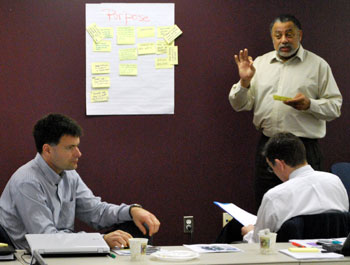Expanded LDFA Board Reflects on Purpose

As part of their look to the future, LDFA board members placed their sticky notes identifying the purpose of the LDFA to a giant poster on the wall. (Image links to high resolution image of entire poster.)
It was not anything personal, said Stephen Rapundalo to Skip Simms, who was sitting across the U-shaped configuration of tables from Rapundalo. He had just voted against Simms’ appointment to the Local Development Finance Authority board.
But over Rapundalo’s objection, shared also by his colleague on the board, Rob Risser, the body voted to add an ex-officio, non-voting seat to the LDFA board, which was filled by Simms. The occasion of the vote on Tuesday morning, held at the SPARK Central Incubator on Liberty Street, was the LDFA board’s regular meeting, which was also billed as a retreat – a facilitator was on hand to lead the group through an exercise to reflect on the organization’s purpose.
As Rapundalo’s assurance to Simms reflected, the new seat on the board was not created for Simms personally, but rather was specified as the designee of “the accelerator’s CEO,” who in this case was Michael Finney of Ann Arbor SPARK. Finney had designated Simms. SPARK contracts with the LDFA to provide services to high-tech start-up companies, and Simms is SPARK’s managing director of business acceleration as well as manager of the Michigan Pre-Seed Capital Fund.
Simms already had a seat at the physical board table when the board’s deliberations took place on the creation of the ex-officio position. So why were Rapundalo and Risser opposed to the expansion of the board in this way?
Who Else Was at the Table?
We begin by setting a bit more of the scene on Tuesday morning, which began at 7:30 a.m. over breakfast. Others who were technically in the audience at Tuesday’s meeting, but who sat at the physical table, included Greg Fronizer, SPARK’s director of finance, and Kurt Riegger, a consultant for SPARK and currently managing partner of Business Engines, as well as a board member of Great Lakes Entrepreneur’s Quest and Ann Arbor Angels.
The LDFA is currently contemplating funding the administrative costs for Ann Arbor Angels, a point scrutinized by Ann Arbor city councilmember Marcia Higgins at council’s last meeting. The occasion of Higgins’ scrutiny was the presentation to council of the LDFA’s annual report by board chair Richard King.
Deliberations on Board Appointment
The dissenting board members to the new board appointment – Stephen Rapundalo, president of MichBio, and Rob Risser, CFO of Advanced Photonix, Inc. – cited the potential conflict of interest created by having a contractor with the LDFA board also sitting on the board. Any potential conflict, however, seems embedded in the 2002 agreement between the cities of Ann Arbor and Ypsilanti, which was required in order to create the LDFA under the SmartZone enabling legislation. It’s worth noting that the Washtenaw County board of commissioners needed to sign off on the SmartZone as well. On Tuesday morning, the agreement between the cities was cited by board chair Richard King as the legal basis for the board appointment:
The Board shall appoint two (2) ex-officio non-voting members consisting of a representative of the MEDC and a representative from the Accelerator. In addition, the Board may appoint other ex-officio non-voting members of the Board.
In this case, “the Accelerator” seems not to be defined within the document outlining the agreement. However, the term would be understood in the context of the 2002 application to the Michigan Economic Development Corporation (MEDC) by the Ann Arbor-Ypsilanti SmartZone for $.5 million in funding as a part of the MEDC’s business accelerator program. In the council resolution supporting that application, it’s the Ann Arbor ITZone – which eventually merged with Ann Arbor SPARK – that is identified as the energy behind the accelerator program. And it was the ITZone’s Kurt Riegger who directed the accelerator program. Now in 2009, it’s thus Ann Arbor SPARK’s business accelerator that would be understood as the referent of “the Accelerator” in the agreement between the two cities.
Board members who argued for the appointment cited the new position’s non-voting status as ameliorating the potential for the conflict of interest. Board member Lisa Kurek, managing partner of Biotechnology Business Consultants, also argued that it was important for people with information relevant to the board’s deliberations to be able to convey that information to the board in a timely fashion.
Later in the meeting, Rapundalo would illustrate a possible parliamentary mechanism by which non-board audience members can contribute relevant information, by noting its lack of application. Riegger, an audience member seated at the board’s table, began speaking without his participation having been solicited by a board member, as required by Robert’s Rules of order, and this was met by Rapundalo with: “Mr. Chairman, a point of order!” King then quickly called on Riegger to speak.
Outcome: The position was created and Simms was accepted as a participating but non-voting member of the LDFA board.
SPARK and Reflecting on the LDFA Purpose
After the board was expanded, the group then heard a presentation from SPARK team members on its activities. The presentation included an explication of how high-tech companies grow, an overview of other organizations involved in various economic development activities, and how the University of Michigan fits into the picture. It also included a rough breakdown of SPARK’s core budget of around $2.8 million, 38% of which the LDFA funds. Elizabeth Parkinson, manager of marketing and public relations for SPARK, gave an overview of the marketing efforts on behalf of the Ann Arbor region, and pointed to the recent article in the Detroit Free Press identifying Ann Arbor as a great place in Michigan for entrepeneurs. Parkinson put the value on an advertising purchase of comparable value to the Detroit Free Press article at around $50,000.
The board then turned to the meeting’s main event, which began with the exercise of writing down individual thoughts about the purpose of the LDFA and posting them on a common sheet on the wall labeled “Purpose.”
We provide below rough approximations of what each board member said about their yellow sticky notes as they posted them on the wall.
Tom Crawford: (i) provide resources to achieve the unique community needed to protect growth, and (ii) utilize community experts on the LDFA board to guide economic development efforts.
Stephen Rapundalo: (i) provide supporting services and resources to high-tech start-up ventures, (ii) show a demonstrated return of investment of tax dollars in the form of enhanced economic development, and (iii) enhance infrastructure, whether that is capital or other kinds of infrastructure (roads, sewers, internet conduits).
Rob Risser: (i) acceleration and growth of high-tech companies, (ii) education about the process in the community, as well as among entrepreneurs – it’s not a marketing push, it’s a technology push, (iii) networking infrastructure – people, (iv) infrastructure – meeting rooms, incubators, organizations that provide specific services, and (v) oversight for taxpayer investment.
Richard Beedon: (i) oversight, adherence to charter in spending of money, (ii) come up with new ways to develop programs that work – best practices for creation of high-tech companies, and (iii) analyze effectiveness of programs.
Darryl Daniels: (i) determine priorities for using the money, (ii) monitor effectiveness and efficiency of money that is spent, (iii) identify and support a service provider that supports early-stage technology businesses with counsel and coaching, (iv) identify a service provider that integrates the multiple resources for the benefit of entrepreneurs, (v) encourage early-stage high-growth potential businesses that aren’t in Ann Arbor to re-locate to Ann Arbor, and (vi) market the SmartZone – put a marketing “sizzle” to it: you want to be in Ann Arbor, if you want to be where business development is happening.
Richard King: (i) work with and fund the economic development service provider, and (ii) provide strategic direction and oversight.
Lisa Kurek: (i) provide management and oversight to protect investment, (ii) facilitate the growth of the technology-based economy, and (iii) get positive economic outcome from that tech-based economy.
Theresa Carroll: (i) foster strategic economic development in the SmartZone, and (ii) ensure appropriate use of taxpayer funds.
Mark Maynard: (i) contribute toward a culture of entrepreneurship that’s attractive to graduating students, (ii) create an infrastructure able to sustain university start-ups, and (iii) encourage risk-taking generally.

LDFA board member Roselyn Zator was initially handed a yellow Sharpie to write on yellow sticky notes (background), but negotiated successfully for a green pen. Michael Korybalski drew an analogy to green golf balls that drew a laugh.
Skip Simms: (i) make the connection to the university, (ii) capital development [three keys to developing business: good idea, talent, and capital] possibly by adding a microloan fund; investments for sustainable source of capital when TIF revenue flattens out, (iii) talent attraction [C-level activity "I'd rather have an A-team and a B-product, than an A-product and a B-team." "Technology follows talent."] and (iv) sales development training.
Michael Korybalski: (i) facilitate business acceleration, (ii) facilitate development of companies in multiple ways – stage I, stage II, stage III, and (iii) provide incubation space to small companies, a space to network.
Roselyn Zator: (i) identify how to implement support of business incubation, (ii) implement a cluster of high-tech activity, and (iii) identify how to measure effectiveness of the implementation.
The Chronicle left the meeting as the final sticky notes were posted on the wall and lunch was getting delivered. The board’s early afternoon task was to thrash the individual ideas into categories and prioritize them.
Misc: Why People Are on the Board, or Not
Although we identified Stephen Rapundalo as president of MichBio at the beginning of this article, his name will be more familiar to many Chronicle readers as a Ward 2 representative to Ann Arbor city council. In fact it’s his presence on the LDFA that satisfies the requirement – per the agreement between the city of Ann Arbor and the city of Ypsilanti, which allowed the creation of the LDFA – that one of the six positions afforded the city of Ann Arbor on the LDFA board must be a member of Ann Arbor city council.
Previously, the Ann Arbor city council slot had been filled by Mike Reid, who also continued to serve on the LDFA after leaving council, until he resigned in early October of last year, citing in his resignation letter:
… dissent over recent LDFA board decisions to refuse to demand immediate repayment [by Ann Arbor SPARK] for known instances of over-billing, instances where contemporaneous time records were never kept at all, and instances where employees or family members of employees were paid to consult for their own companies.
Richard Beedon was appointed to fill the vacancy left by Reid.
Rapundalo had joined Reid at the LDFA’s September 2008 meeting in opposing a resolution on a memorandum of understanding that did not require immediate repayment by Ann Arbor SPARK for cases of over-billing.
Based on minutes from the LDFA’s April 2, 2009 board meeting, Rapundalo has continued since September 2008 to push for active attention by the LDFA board to the possible perception of ethical issues:
Note for the following resolution: A conflict of interest issue was raised, the matter was discussed and the Board determined there was no conflict of interest and decided to move forward. [Mark] Maynard moved, seconded by Kurek to authorize expenditure up to $6,500 from the Cantillon Web Based Education Development budget to obtain the usage data needed to evaluate Cantillon usage to date. Motion approved unanimously.
Though the minutes don’t reflect who raised the question, in a followup phone conversation with LDFA board member Mark Maynard, he clarified that the conflict of interest issue was, in fact, raised by Rapundalo. The question was based on the fact that the $6,500 was a contract awarded to the University of Michigan, Maynard’s employer.
Maynard is marketing manager for the University of Michigan Tech Transfer Office, which is headed by Ken Nisbet, member of the SPARK board of directors.
Maynard was put on the LDFA board last fall by Ypsilanti city council, which makes three of the LDFA’s board appointments. The geographic area of the Ann Arbor-Ypsilanti SmartZone LDFA comprises the area of the two cities’ respective Downtown Development Authority districts. Currently the only taxes captured by the joint district come from Ann Arbor, which totaled $1.1 million for fiscal year 2008.





Thanks again for really sterling coverage of an under-reported board. It is reassuring to read that Mark Maynard is a member.
I appreciate your coverage of the LDFA board meeting and capturing the level of detail.
Two quick points, Richard King recognized me to speak by say ‘Why don’t you tell us more- nodding to me?’ and responded to Mr Rapandalo’s request with ‘Yes, that is what I meant’.
Second, to clarify the affiliations, I am an active mentor with Great Lakes Entrepreneurs Quest, I am not on the board. I am an advisor to Ann Arbor Angels and on the board of Great Lakes Angels.
Thanks again for bringing more visibility to the supporting resources for building the next generation of companies in the community: the LDFA and SPARK.
I volunteered to serve on the Board but my application was never even acknowledged by the City or the Board. Thanks for great reporting.
Stew
Stu, A board would never know you applied. You should call your council member. I think the LDFA is like the environmental commission, the council makes the appointments instead of the mayor.
“I think the LDFA is like the environmental commission, the council makes the appointments instead of the mayor.”
It took longer than I’d like to track it down, but at the November 17, 2008 meeting, the appointment of Beedon to the LDFA to replace Reid, who resigned, was achieved by a resolution submitted by councilmember Rapundalo. [Confirming that Lake's thought is correct.]
That’s interesting — the Legistar page for the LDFA does not list who Beedon was appointed by, but everyone else except Rapundalo was appointed by Hieftje. I wonder if that information is accurate.
Legistar link
“A board would never know you applied.”
Actually, for informational purposes (as opposed to proving Dusty wrong), we sometimes do know who applies. People tell us that they’ve done so or they contact us directly to inquire about it. We don’t have any say in the selection, however.
Thanks Steve. I guess sometimes a board would know if people tell you they applied.) I checked on the LDFA with my council member, (at Kroger) and like the Environmental Commission where you serve (Thank you!)the LDFA is appointed by council instead of the Mayor. The Greenbelt is that way too. I didn’t ask if there were more but I don’t think there are.